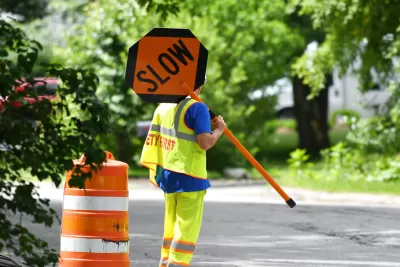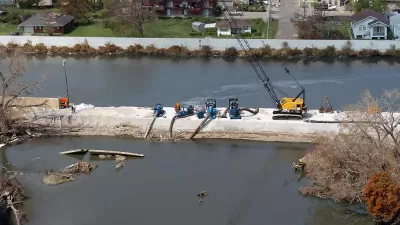After years of delays, cost overruns, and deadline extensions on a FEMA-funded street repair program, New Orleans officials face a massive funding shortfall and accusations of mismanagement.

As part of a 2015 deal to settle outstanding Hurricane Katrina Claims, the U.S. Federal Emergency Management Service granted the city of New Orleans $1.7 billion to complete nearly 300 street projects by August 2023. But as of May 2018, only $10 million of the funding was under construction and the city was under federal scrutiny. In 2022, that deadline was pushed to March 2025. Today, with less than a year to go, according to an article from Nola.com, not only are city officials planning to request another extension, but they are also facing a budget shortfall of as much as $1 billion.
“According to Joe Threat, the city's Deputy Chief Administrative Officer for Infrastructure, estimates from the construction firms involved in the work have skyrocketed due to higher costs for labor and materials that have impacted all sorts of projects since the start of the pandemic,” reports Nola staff writer Sophie Kasakove. Costs also rose as workers began tearing up streets and identifying additional repair needs. But some local elected officials say the program has been handled badly from the start.
In an effort to get a handle on delays and cost overruns, which Kasakove writes have plagued the effort over the past six years, the city recently contracted consulting firm CDM Smith, which identified the $1 billion estimated shortfall as part of a draft “gap analysis.” She reports “68 out of 273 projects set to be completed through what's known as the Joint Infrastructure Recovery Request, or JIRR, are currently on hold awaiting additional funding,” and 100 projects are in the planning process but not yet started, according to the city’s roadwork website. The city has expressed its commitment to completing all the projects, but local leaders and residents are frustrated and quickly running out of patience.
FULL STORY: Officials face up to $1 billion funding shortfall for New Orleans roadwork

Planetizen Federal Action Tracker
A weekly monitor of how Trump’s orders and actions are impacting planners and planning in America.

Canada vs. Kamala: Whose Liberal Housing Platform Comes Out on Top?
As Canada votes for a new Prime Minister, what can America learn from the leading liberal candidate of its neighbor to the north?

The Five Most-Changed American Cities
A ranking of population change, home values, and jobs highlights the nation’s most dynamic and most stagnant regions.

San Diego Adopts First Mobility Master Plan
The plan provides a comprehensive framework for making San Diego’s transportation network more multimodal, accessible, and sustainable.

Housing, Supportive Service Providers Brace for Federal Cuts
Organizations that provide housing assistance are tightening their purse strings and making plans for maintaining operations if federal funding dries up.

Op-Ed: Why an Effective Passenger Rail Network Needs Government Involvement
An outdated rail network that privileges freight won’t be fixed by privatizing Amtrak.
Urban Design for Planners 1: Software Tools
This six-course series explores essential urban design concepts using open source software and equips planners with the tools they need to participate fully in the urban design process.
Planning for Universal Design
Learn the tools for implementing Universal Design in planning regulations.
New York City School Construction Authority
Village of Glen Ellyn
Central Transportation Planning Staff/Boston Region MPO
Institute for Housing and Urban Development Studies (IHS)
City of Grandview
Harvard GSD Executive Education
Regional Transportation Commission of Southern Nevada
Toledo-Lucas County Plan Commissions





























